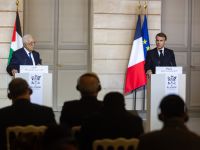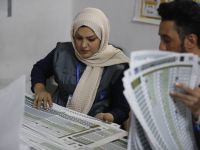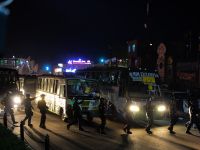Israeli Prime Minister Ehud Barak said Sunday he would be ready to hold peace talks in the United States 'if there is a drop in the violence' that has rocked the Palestinian territories for a month, but was pressing ahead with plans to form an emergency government with the right wing.
"We are committed by the Sharm el-Sheikh accord and we want to see if it is possible to relaunch the peace process," Barak said on public radio, referring to the agreement reached with the Palestinians on October 17 to take steps to quell the unrest.
"If the violence drops we will go to Washington to see if there is something to discuss," he added.
Clinton had invited both Barak and Palestinian leader Yasser Arafat for separate talks in the United States, but said Friday he was disturbed by the continued killings and that there could be no negotiations until the violence eased.
Acting Israeli Foreign Minister Shlomo Ben Ami is to visit Washington as well as Paris and London next week.
A total of 145 people have been killed -- all but eight of them Arabs -- since force clashes broke out after Israeli right-wing leader Ariel Sharon's controversial September 28 visit to the al-Aqsa mosque compound in occupied east Jerusalem, a site sacred to both Jews and Muslims.
Tensions remained high on the ground in the West Bank and Gaza Strip Sunday after sporadic clashes and exchanges of fire overnight.
"It is possible that the Palestinians have opted for violence to create a state that will not be friendly towards us, and we shouldn't feel guilty about the situation," Barak said.
"Our Palestinian partners are more complex than we thought and peace is more difficult to achieve than we thought."
On the creation of an emergency government, Barak said: "We are ready to envisage a broader emergency government and we are also ready to function with the security net which the Shas party has proposed during this emergency situation."
He was referring to a decision by the ultra-Orthodox Jewish Shas, a lynchpin in successive coalition governments, to support Barak from outside during the crisis although it rejected an invitation to return to the government it quit in July in protest at Barak's peace policies.
He is scrambling to form a new government with the inclusion of the right-wing Likud bloc of hawkish former defense and foreign minister Ariel Sharon before parliament resumes on Monday, with an early elections bill pending.
"The staging of early elections and a national emergency situation are incompatible," Barak added.
But Palestinians have warned that the inclusion of Sharon, whom they also blame for the massacre of Palestinian refugees in Lebanon in 1982, would mean the end of the peace process.
Israeli public radio said Barak and Sharon were expected to meet on Sunday after making progress on reaching an accord, but there was no confirmation from the prime minister's office.
Sharon was demanding a veto over any peace process and security decisions, a condition Barak has vehemently rejected.
"No government can accept the right of veto by one of its members as a condition for taking part in its affairs," Finance Minister Avraham Shohat said.
On the diplomatic front, German Chancellor Gerhard Schroeder kicked off a tour of the Middle East in Egypt on Saturday, calling for an end to the clashes.
"It's in everybody's interest that the violence comes to an end. The end of the violence is the basis for continuing the peace process," he said – JERUSALEM (AFP)
© 2000 Al Bawaba (www.albawaba.com)







